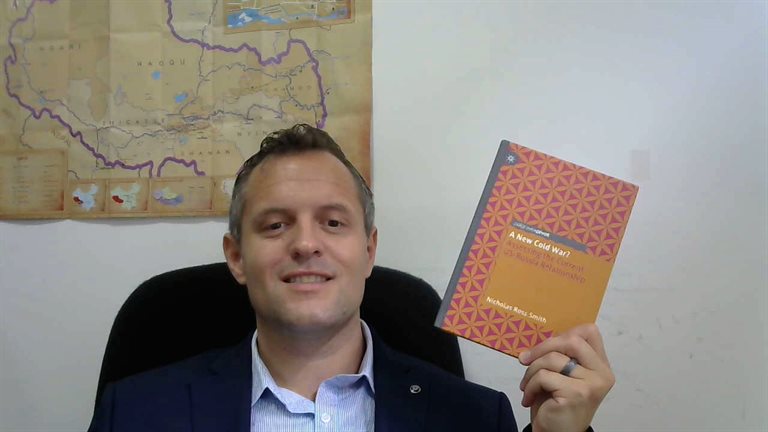
In the Faculty of Humanities and Social Science at UNNC, we have a great many research-active academics who lecture about creative topics from all around the world. Our School of International Studies (IS) is well known for its cutting-edge publications addressing International Relations, all of which are used by researchers, think tanks and politicians around the globe to better understand our globalized world today.
This week, we caught up with IS Assistant Professor Nicholas Ross Smith, who has been busy publishing his research about the Cold War. Nick is so busy, that he’s already published his second book in the past 3 years! Luckily though, he had some spare time to talk to us about his project and his advice for upcoming researchers…
Hi Nick! Please tell us about your new book!
It is called ‘A New Cold War? Assessing the Current US-Russia Relationship’. Essentially, it is a comparison between the original Cold War between the United States and the Soviet Union and the current relationship between the United States and Russia. I identify four main ‘dimensions’ of the Cold War which I deem crucial to how it unraveled – structure, ideology, psychology, and technology – and then apply that to the current relationship. I find that each of these dimensions is significantly different in the current relationship and, because of this, it is unsuitable to characterize this relationship as a New Cold War.
That’s really interesting, and it seems very relevant to current events today. What inspired you to write about this topic?
My previous book examined, in part, Russia’s changing foreign policy towards Eastern Europe and although I was troubled by how belligerent it had become, I still felt that there was some rationality to their decision-making. When the accusations that Russia meddled in the 2016 US presidential elections, there was an instant evocation of the original Cold War as an analogy. To my mind, this was done quite uncritically and based on my previous research, I was highly skeptical that this was the case. So, I decided to construct a framework to compare the two periods and demonstrate that the analogy was way off.
How did you conduct the research?
In foreign policy analysis, we are sometimes constrained by what research we can do because we can never access the people we really want to talk to. Of course, ideally, I would love to talk to Vladimir Putin and Sergey Lavrov or Donald Trump and whoever the secretary of state was (it changes so often now!). But sadly, that is largely impossible. So, I had to go digging through a plethora of official documents, newspapers, and scholarly articles to construct narratives around the foreign policies that were being pursued at these different times.
We think that world leaders should be very happy to talk with you! But what support did you receive in your research?
The first thing I did was float this idea with some of my colleagues here at the University of Nottingham Ningbo China and with some trusted peers at other universities around the world. But once I was comfortable that the idea was tenable, I put together a book proposal and sent it off to Palgrave. The peer reviewers were great. One – Roger Kanet – is a real hero of mine. He is now 85 years old and is one of the leading authorities on the Cold War. So, his advice was fantastic, and he really helped push the manuscript to new heights.
That’s really nice to hear. Were there any surprises along the way?
Plenty! I thought I had a fairly good grasp of the Cold War, but the more I delved into the different sources the more I realized that I only had a superficial understanding. It was just so interesting reading all the different anecdotes of the time. The post-WWII setting was bizarre and there was so much uncertainty as to the future, so it helped fuel a kind of ridiculousness. The best part is that now I teach on a module that covers the Cold War period, so I am able to share many of the anecdotes and events that I discovered with my students.
What are your future research plans now?
I have switched my attention from great power competition to looking at the different ways relatively smaller powers try and survive when they find themselves situated in tense regional environments. I want to write a book on this topic, looking at the cases of Yugoslavia and Albania during the Cold War, Ukraine and New Zealand in recent times, and Kashgaria, a breakaway state during the Great Game. In addition to this, I am also researching China’s use of friendship in its efforts to build its own international order and the potential impact of crypto-technologies – like blockchains – on international politics.
Wow! You’re going to be very busy. Finally, can you tell us, what is your advice to students who would like to study and research in your topic?
I think having passion for a topic is an important pre-requisite to doing a good job. Some of my colleagues were lamenting that I had to work weekends to get this book finished but, truth be told, I really enjoyed it and found it really stimulating. The same is true of my new work. I am fortunate that I have found topics that excite me. So, following your passions is important, but also you need to combine this with hard work and feedback. On the last point, getting honest feedback is so helpful and although criticisms can hurt, it is important to the final product. So, to students, I encourage you to seek out feedback from your lecturers and tutors, it can make a huge difference in the long run.